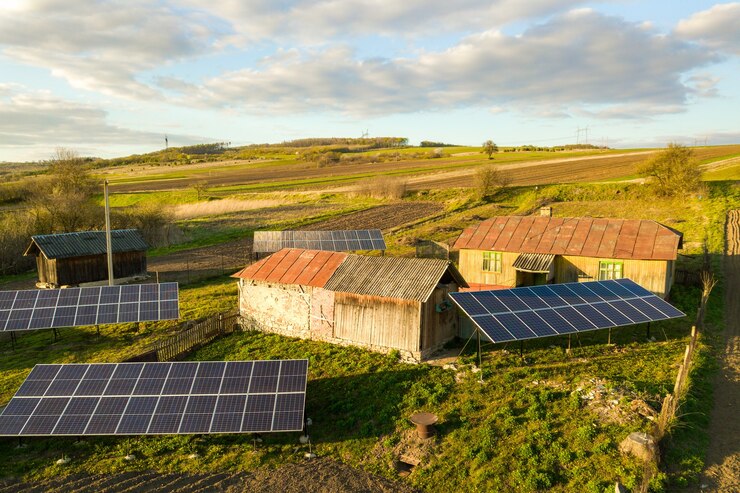Renewable energy in rural communities is transforming the way power is generated, distributed, and accessed. In areas that were previously underserved or lacked reliable electricity, renewable energy solutions like solar, wind, and small-scale hydro provide dependable, affordable, and clean alternatives. This energy shift is enhancing economic growth, creating new jobs, improving public health, and promoting environmental sustainability.
Increased Access to Reliable Power in Rural Areas
One of the biggest benefits of renewable energy in rural communities is the improvement in electricity access. Many remote areas face high costs and logistical challenges in connecting to the traditional power grid, leading to unreliable or nonexistent power. Renewable energy offers a solution by allowing these communities to generate power locally, providing the foundation for a better quality of life.
- Community Solar Projects for Rural Electrification: Community solar projects are becoming increasingly popular in rural areas. Through shared solar installations in central locations, multiple households can access clean, affordable electricity. This approach ensures that people in remote regions have dependable energy without the high individual cost of solar panel installation.
- Off-Grid Solutions Using Renewable Energy: Microgrids and off-grid solutions powered by solar, wind, or hybrid systems allow rural communities to become energy self-sufficient. These systems are ideal for areas where extending the central power grid is too costly or impractical. By generating and storing their own electricity, communities are no longer dependent on external energy sources, making power outages and shortages less frequent.
Economic Growth Through Renewable Energy in Rural Communities
Renewable energy in rural communities not only improves access to power but also stimulates economic development. Clean energy projects create job opportunities and enhance financial stability for local economies, offering long-term benefits for residents and local businesses alike.
- Job Creation in Rural Areas: The renewable energy industry, especially sectors like solar and wind, generates jobs in installation, maintenance, and engineering. Many of these positions do not require advanced degrees, making them accessible to a larger portion of rural populations. Renewable energy projects help reduce poverty and provide a source of steady income for local residents.
- Support for Local Businesses: By reducing energy costs, renewable energy supports the growth of local businesses. With lower electricity bills, rural enterprises can allocate more resources to expansion, pay employees better wages, and invest back into their communities. This economic empowerment encourages sustainable development and strengthens the local economy.
Environmental and Health Benefits of Renewable Energy in Rural Communities
Switching to renewable energy in rural communities offers substantial environmental and health benefits. Clean energy sources such as solar, wind, and hydro reduce air and water pollution, which leads to healthier living conditions and less environmental degradation.
- Cleaner Air and Water: Unlike fossil fuels, renewable energy produces minimal emissions, resulting in cleaner air and water. This decrease in pollution significantly reduces the risk of respiratory and cardiovascular diseases in rural populations, where traditional fuel sources have often been harmful to public health.
- Resource Conservation: Renewable energy systems rely on natural, inexhaustible resources like sunlight and wind. This approach reduces reliance on fossil fuels and preserves valuable natural assets, allowing rural communities to continue traditional practices, such as farming and fishing, without depleting their environment.
Enhancing Quality of Life Through Renewable Energy in Rural Communities
Renewable energy in rural communities goes beyond just providing power; it also enhances residents’ overall quality of life. With reliable electricity, communities gain access to essential services like healthcare and education, which are critical for sustainable growth and resilience.
- Education and Healthcare Accessibility: With stable power, schools and healthcare facilities in rural areas can operate more effectively. Students have access to lighting for studying after dark, and healthcare centers can use electricity to power essential equipment and refrigeration for medicines. Reliable energy access directly improves the quality of education and healthcare services available to rural populations.
- Community Empowerment: Renewable energy projects in rural communities often involve community input and participation. Many projects are community-led, with residents taking ownership of their energy resources. This sense of empowerment and participation




